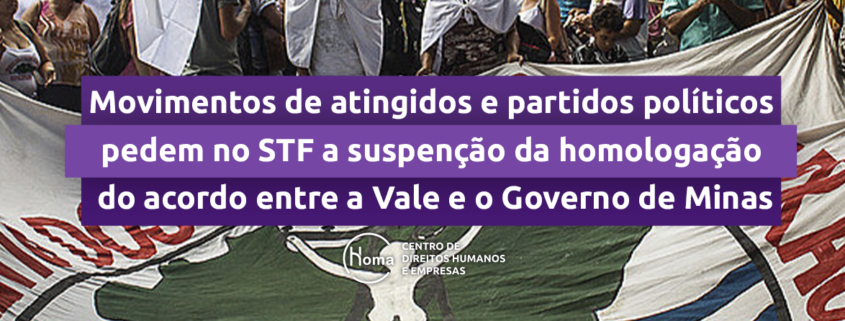People affected by Vale’s billion-dollar agreement in Brumadinho filed a suit in the Brazilian Supreme Court.
With the support of ANAB, CASEC, PSOL and PT, the lawsuit claims for hearing and full reparation of damages in the Rio Paraopeba river basin
On Wednesday (10), communities affected by Vale’s socio-environmental crime in Brumadinho filed a lawsuit in the Brazilian Supreme Court (STF), asking for the suspension of the ratification of the reparation agreement signed last week between the company and the government of Minas Gerais. The document has the support of the Movement of People Affected by Dams (MAB) and the Movement for Popular Sovereignty in Mining (MAM) and was supported by a number of entities, political parties and parliamentarians: National Association of People Affected by Dams (ANAB), Center for Socioeconomic Alternatives of the Cerrado (CASEC), Socialism and Freedom Party (PSOL), Workers’ Party (PT), federal deputy Áurea Carolina (PSOL/MG), federal deputy Rogério Correia (PT/MG) and state deputy Beatriz Cerqueira (PT/MG).
This is an Argument of Violation of Fundamental Precepts (ADPF), an action that can be analyzed by the Brazilian Supreme Court in cases of violation of the Brazilian Federal Constitution. The group claims the right of the affected people to participate, directly and under equal conditions, in the negotiations about the reparation of the socio-environmental and socio-economic damages resulting from the burst of the Córrego do Feijão mine dam, in Brumadinho.
Reparations without listening to the victims
Under negotiation since October 2020, the reparation agreement was discussed under secrecy, in confidential hearings between Vale, the government of Minas Gerais and the state’s justice institutions. Although the affected people organized themselves with the Independent Technical Advisors and produced documents such as the Matriz de Reparação de Danos Urgentes (Urgent Damage Reparation Matrix), they were prevented from participating in the process and only had access to the terms after the execution of the settlement, which took place last Thursday (4th).
The lawsuit also highlights the violation of Convention No. 169 of the International Labor Organization (ILO), of which Brazil is a signatory, which states that peoples and communities must be consulted in relation to any project that affects their way of life. The burst of the dam generated impacts for indigenous peoples who live in the Paraopeba river basin, as well as quilombola communities, artisanal fishermen, family farmers, traditional extractivist groups, geraizeiros (traditional people who live in the Cerrados to the north of Minas Gerais), benzedeiras (folk healers), and gypsy peoples, were all excluded from the negotiation processes.
According to Joceli Andrioli, MAB’s coordinator, “it is absurd that after a crime that killed 272 people, destroyed the livelihoods of thousands of people, and left communities without water and in a deep process of getting sick, an agreement was reached without the participation of the affected people. Joceli also explains that “the resources foreseen in the agreement must guarantee emergency actions for at least the next four years, in addition to the full reparation of the lives of those affected, and this is only possible with the free and informed participation of those affected,” he adds.
Terms of the agreement
Based on data produced in technical studies, ADPF demonstrates that the amount of about US$7.7 billion is insufficient to ensure the financing of all reparation measures. Technical studies produced by the João Pinheiro Foundation and the Public Prosecutor’s Office of Minas Gerais established the figure of US$10 billion, presented by the state in preliminary hearings. Discounting what had already been disbursed by Vale in emergency actions, which was included in the agreement, the amount agreed upon does not reach half of this value.
Entities that support the affected families have made a survey of seven key points that are detrimental to the communities affected by the tragedy:
- There was no participation of the affected communities in the elaboration of the agreement;
- The amounts foreseen for the affected people are much smaller than what will be allocated to the state. Only US$1,42 billion of the agreement will be directed to the people affected in the entire Paraopeba river basin.
- The money provided for emergency actions and income distribution is not enough to support all the affected communities for the four years proposed.
- The pending emergency aid, denied to more than 20,000 affected people, was not included in the agreement.
- The amount of the agreement includes US$ 330 million that has already been paid in emergency actions.
- Most of the money that will be destined for the state will not be invested in the affected region, but in road infrastructure works, such as the construction of a ring road and a subway station in the capital.
- At the end of the negotiations, Vale had a discount of almost US$3,8 billion from what had been prescribed.
For members of MAM, the conclusion of the agreement reconciles Vale’s interest in maintaining a good image with the electoral pretensions of the state governor. “Vale’s concern is much greater in responding to stockholder than in repairing the damage in Brumadinho or helping the affected communities,” says Marcelo Barbosa, MAM’s regional coordinator and a resident of Brumadinho. “With this inflow of resources, Zema will be able to carry out a series of infrastructure projects in the state, most of them in (the capital) Belo Horizonte, with a possible election in mind,” he adds.
Extinction of expert testimony – risk to the due assessment of damages
According to the draft of the agreement, most of the UFMG’s judicial expertise has been extinguished, which aimed to assess the environmental damage to the basin and the affected communities. It was also set that the assessment of the damage and environmental remediation actions will be defined only by the full remediation plan, prepared by a private company hired directly by Vale S/A (Arcadis). This situation is extremely worrying, because the assessment of the damage, which was initially going to be done by an independent academic entity, will now be done by a private company hired by Vale. We understand that this could generate irreparable damage to the environment and to the Paraopeba river basin.
ADPF Claims
In general lines, the action presented to the STF can be summarized in three key points:
1) The annulment of the agreement, so that the free and informed participation of the affected people is made possible, respecting
– Minimum guarantee of implementation of the rights already prescribed in the agreement agreed upon between Vale and Minas Gerais that have been destined directly to the affected people, as well as maintenance of the governance system already established;
– Possibility of participation of the affected people in all parts of the agreement, including in the destination and distribution of resources;
– Maintenance of the payment of emergency aid to the families for the duration of the consultation procedure;
– Publicity and transparency in judicial and administrative acts throughout the negotiation of the terms of the agreement;
– State legislation authorizing approval of the agreement.
2) Establishment, by the STF, of minimum criteria for the participation of those affected in the elaboration of the agreement.
3) Consideration of the ADPF with priority by the en banc of the Brazilian Supreme Court.
Institutional repercussion
Federal Deputies Áurea Carolina (PSOL/MG) and Rogério Correia (PT/MG), who are members of the External Commission created in the Chamber of Deputies to monitor the negotiations, stress that they are not against the execution of an agreement, but rather the authoritarianism in the way the process is being handled. “In these two years, we have accompanied processes of sickness and death resulting from this criminal tragedy. Disregarding the people affected is to continue subjecting these families to have their rights violated,” Áurea argues.
Rogério says that there is no condescension since Vale is responsible for the crimes in Mariana and Brumadinho. “It’s not really about an agreement, but the obligation to pay. Vale is offering much less than it owes to Minas Gerais and especially to those affected by the dams,” he criticized. The deputy is in line with the expectations of those affected by the extension of the agreement, as demanded by the communities impacted by the tragedy.
State deputy Beatriz Cerqueira (PT/MG), head of the Assembly of Minas PCI that investigated the dam burst, denounces that the company continues to violate rights in other cities of the state: “I was in Citrolândia (Betim), Mário Campos and Juatuba, and Vale continues with its crimes. There are communities that have had their ways of life totally destroyed.” She stresses that the agreement cannot bypass people’s suffering to become an electoral platform. The parliamentarians support the initiative so that the affected families can be protagonists in this process.




Leave a Reply
Want to join the discussion?Feel free to contribute!